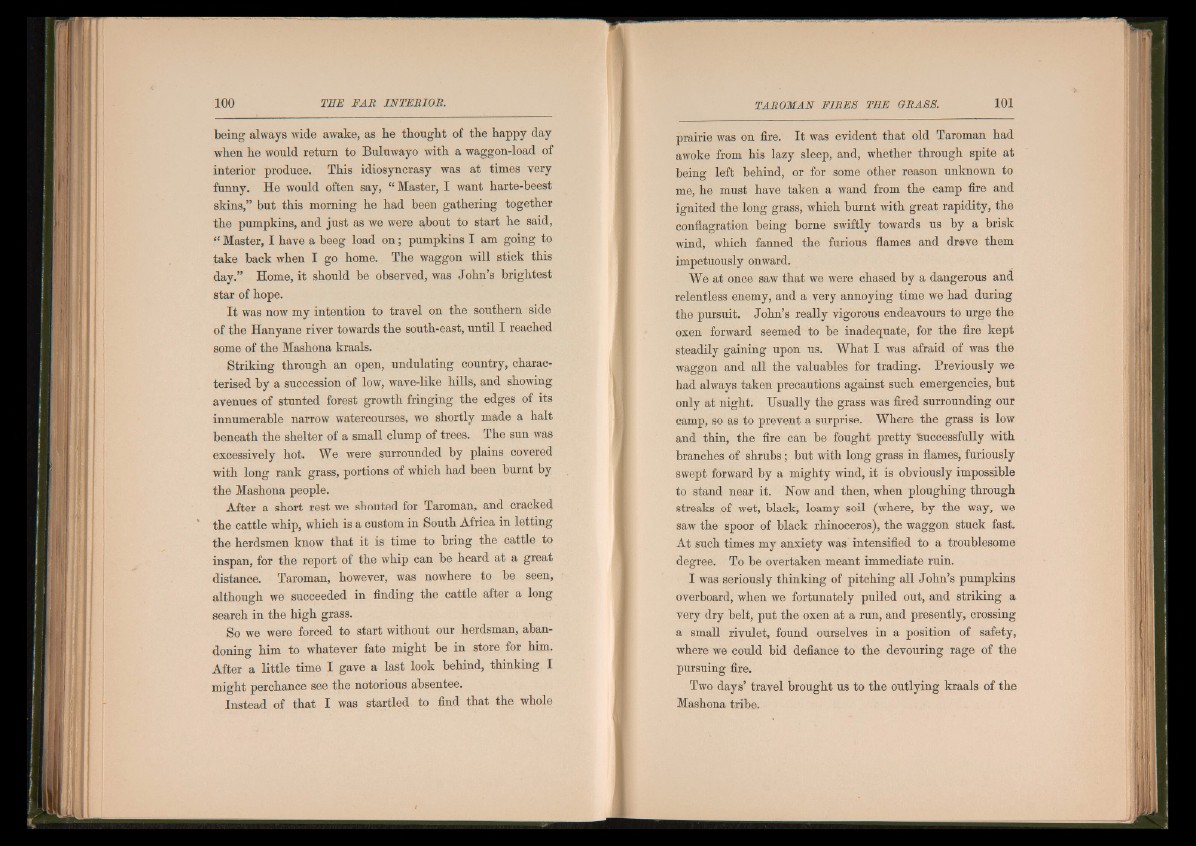
being always wide awake, as be thought of the happy day
when he would return to Buluwayo with a waggon-load of
interior produce. This idiosyncrasy was at times very
funny. He would often say, “ Master, I want harte-beest
skins,” but this morning he had been gathering together
the pumpkins, and just as we were a,bout to start he said,
“ Master, I have a beeg load on; pumpkins I am going to
take back when I go home. The waggon will stick this
day.” Home, it should be observed, was John’s brightest
star of hope.
I t was now my intention to travel on the southern side
of the Hanyane river towards the south-east, until I reached
some of the Mashona kraals.
Striking through an open, undulating country, characterised
by a succession of low, wave-like hills, and showing
avenues of stunted forest growth fringing the edges of its
innumerable narrow watercourses, we shortly made a halt
beneath the shelter of a small clump of trees. The sun was
excessively hot. We were surrounded by plains covered
with long rank grass, portions of which had been burnt by
the Mashona people.
After a short rest we shouted for Taroman, and cracked
the cattle whip, which is a custom in South Africa in letting
the herdsmen know that it is time to bring the cattle to
inspan, for the report of the whip can be heard at a great
distance. Taroman, however, was nowhere to be seen,
although we succeeded in finding the cattle after a long
search in the high grass.
So we were forced to start without our herdsman, abandoning
him to whatever fate might be in store for him.
After a little time I gave a last look behind, thinking I
might perchance see the notorious absentee.
Instead of that I was startled to find that the whole
prairie was on fire. I t was evident that old Taroman had
awoke from his lazy sleep, and, whether through spite at
being left behind, or for some other reason unknown to
me, he must have taken a wand from the camp fire and
ignited the long grass, which burnt with great rapidity, the
conflagration being borne swiftly towards us by a brisk
wind, which fanned the furious flames and dr®ve them
impetuously onward.
We at once saw that we were chased by a dangerous and
relentless enemy, and a very annoying time we had during
the pursuit. John’s really vigorous endeavours to urge the
oxen forward seemed to be inadequate, for the fire kept
steadily gaining upon us. What I was afraid of was the
waggon and all the valuables for trading. Previously we
had always taken precautions against such emergencies, but
only at night. Usually the grass was fired surrounding our
camp, so as to prevent a surprise. Where the grass is low
and thin, the fire can be fought pretty 'Successfully with
branches of shrubs; but with long grass in flames, furiously
swept forward by a mighty wind, it is obviously impossible
to stand near it. How and then, when ploughing through
streaks of wet, black, loamy soil (where, by the way, we
saw the spoor of black rhinoceros), the waggon stuck fast.
At such times my anxiety was intensified to a troublesome
degree. To be overtaken meant immediate ruin.
I was seriously thinking of pitching all John’s pumpkins
overboard, when we fortunately pulled out, and striking a
very dry belt, put the oxen at a run, and presently, crossing
a small rivulet, found ourselves in a position of safety,
where we could bid defiance to the devouring rage of the
pursuing fire.
Two days’ travel brought us to the outlying kraals of the
Mashona tribe.